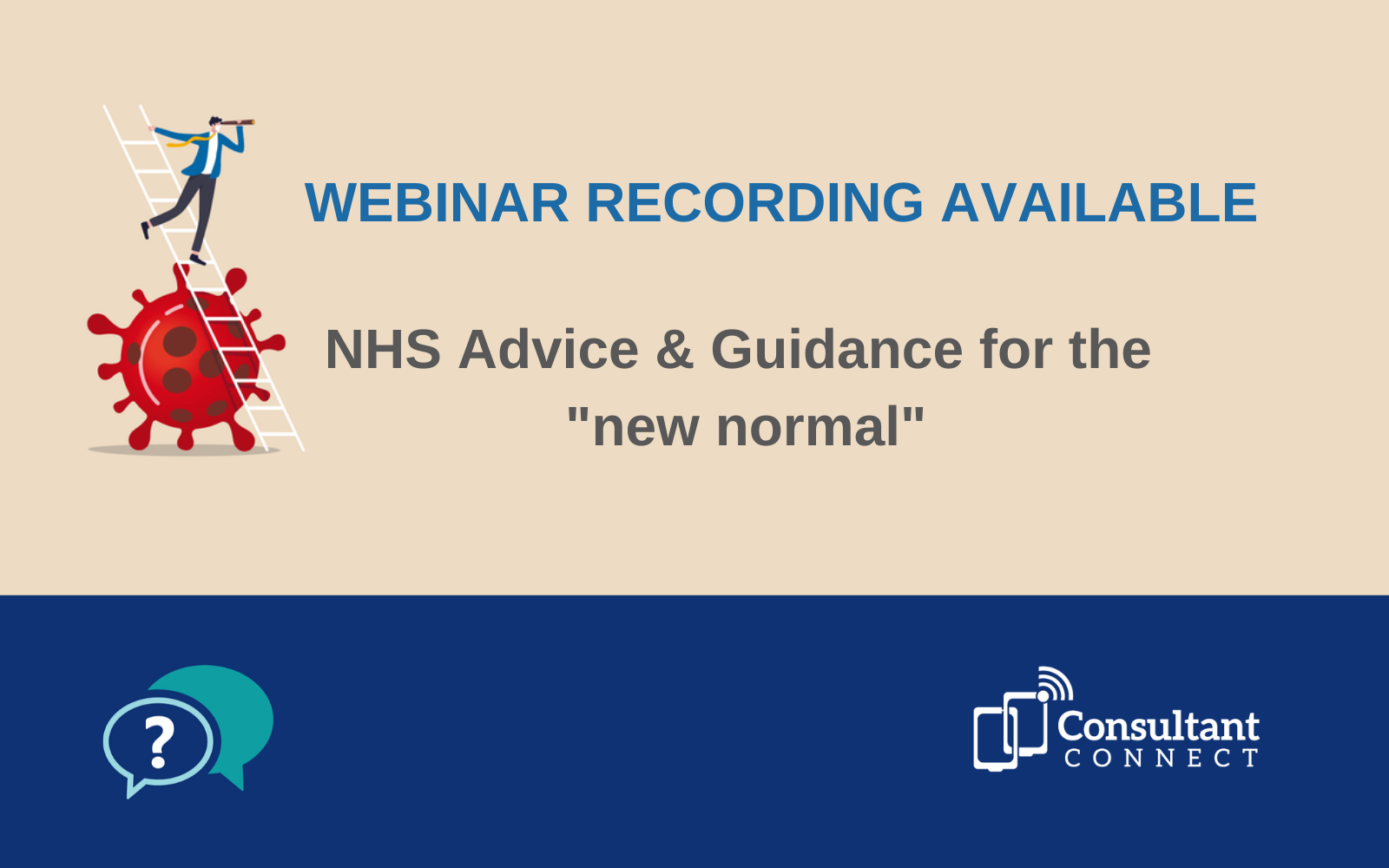Many CCGs and Health Boards have needed to fast-track new systems to support key services during the pandemic. Last week we caught up with Senior Programme Manager, Stephen Wells from Enfield Borough Directorate, NHS North Central London CCG, to find out how the CCG managed to roll out Consultant Connect at pace, achieve highly positive feedback from patients and clinicians, and build resilience.
NHS North Central London CCG (NCL CCG) is a new organisation, established in April 2020. It has brought together five existing CCGs – Barnet, Camden, Enfield, Haringey and Islington.
1. What types of Advice & Guidance were you using before commissioning Consultant Connect? What led you to consider Consultant Connect as an additional channel for advice?
Stephen says;
“We were using NCL-wide CCG’s Advice & Guidance developed in collaboration with commissioners and local Trusts. Unfortunately, the uptake and use of the advice and guidance was problematic in terms of implementation in each of the Trusts and associated response times to GPs. However progress was being made and this local approach was impacted by the COVID-19 pandemic.
In the Enfield borough of NCL CCG, we wanted to consider the use of Consultant Connect for the following reasons:
- To support GPs during the COVID-19 pandemic and provide them with access to 18 specialties – given the significant reduction in planned care and support GPs to seek advice and guidance to manage patients at this time.
- To build on the borough-based Community Cardiology and triage service (consultant-led) which was launched in February 2020, which included Consultant Connect Advice & Guidance through accessing local consultant cardiologists. This approach was in line with the NHS England Elective Cardiology Handbook (published in 2019).”
2. Who did you involve in discussions and what were their concerns?
Stephen says;
“We involved; CCG GP Governing Body GPs, CCG Directors, PCN Clinical Directors, and GP Clinical Leads.
We held a GP engagement meeting with 25 GPs across our Primary Care Network localities and two Acute Trusts. The main concerns raised were:
- Impact on local referrals – would Consultant Connect Advice & Guidance be different to the CCG’s local Advice & Guidance policy?
- Would GP calls be answered as quickly as suggested by Consultant Connect?
- Cost of system i.e. yearly licence cost vs. potential reduction in outpatient referrals
- Value for money – would Consultant Connect represent a realistic cost saving to the local system?
- How quickly could the digital solution be implemented?
- Cost of clinical triage calls?
- How to reimburse local Trusts for local consultant time
- Which local consultants to ask to participate in the Consultant Connect rota across key specialties
- Should we select six local specialties or access out-of-area NHS consultants via the National Consultant Network for the phase 1 roll out?”
3. What do you think were the most important elements of your business case in persuading colleagues?
Stephen thinks it was highly useful to include the following in their business case;
- “Benefits for GPs:
- Ability to manage patients during the COVID-19 pandemic via timely Advice & Guidance
- Providing access to clinical advice to inform appropriate diagnostics
- Support to allow them to manage patients in primary care, without referring to Outpatients
- Ability to upload images and use of the photo-messaging capability for teledermatology, cardiology diagnostics reports i.e. ECGs, echocardiography images, podiatry.
- How the system works with existing tools. It was good to outline how the use of Consultant Connect would work with the local Borough Referral Management service (supporting local GP clinical triagers and the e-RS system)
- The opportunity to develop local solutions through a single point of access via Consultant Connect (including Mental Health, local Trust’s clinical hotlines)
- The level of support provided by Consultant Connect to engage, train local GPs, Primary Care Networks, through webinars, in real-time
- Robustness of the Consultant Connect telephony solution to access the National Consultant Network – simplicity of the Consultant Connect App
- Opportunity to extend the service using photo-messaging. The CCG were keen to support with the management of specialties inc. teledermatology (including the ability for patients to take photo(s) and share with their GP. This works well with virtual triage between GP and patient, podiatry, orthopaedics)
- Evidence of GDPR and NHS IG compliance. The CCG undertook an assessment to complement the evidence provided by Consultant Connect.”
4. How did you manage to get buy-in from local GPs and consultants?
Stephen says;
- The pandemic – the significant reduction in routine outpatients available and urgent need for primary care to rapidly communicate with secondary care
- Demonstrate alignment with other digital solutions available to GPs and hospital clinicians e.g. we developed a cardiology clinical triage and diagnostic service by engaging with two local acute Trusts (in North Central London) to provide consultant triage via the CCG’s referral management service. Consultant Connect was included as the advice and guidance element to the revised cardiology diagnostics pathways in primary care
- Establish a weekly project group with all clinicians involved
- Pilot the solution. We implemented a pilot prior to the COVID-19 pandemic
- Host CCG GP engagement meetings. We hosted these with local GPs, CCG GP Government Body members, PCN Clinical Directors, GP Chair of CCG
- Deliver follow-up webinars. Consultant Connect organised these for us, with PCN Clinical Directors (x6), and separate Practice Manager webinars
- Meet regularly with Trust senior management teams, CCG colleagues and Consultant Connect to review opportunities to build on pathways
- Develop joint CCG and Consultant Connect communication materials. These have been very well received by GPs across 46 practices during their weekly communication meetings
- Demonstrate the positive impact of a wider range of specialties and Advice & Guidance tools. The National Consultant Network provided enhancement through improved response times, use of the photo-messaging element of Consultant Connect enabled safe sharing of patient photos (identified by NHS number, storage of images on a secure online cloud and GP clinical systems)
- Ensuring all are aware of Medico-legal cover – the system records each telephone call
- Opportunity to undertake clinical audit to review quality of advice & guidance for high use specialties vs. local consultant advice & guidance, inform GP training”
5. Why do you think your project is a success?
Stephen says;
“The work we undertook to get buy-in was essential, but it is important to engage with our stakeholders regularly, on an ongoing basis by:
- Regular email and text message updates to remind GPs/ Practice Managers of the service and when new specialities are added. Keeping messages simple and to the point and signpost key contacts to address issues to or seek support from
- Delivering joint training sessions (webinars, face-to-face meetings, with CCG and GPs, PCNs, etc)
- Ensuring other systems are still available e.g. local referral management service working to complement Consultant Connect
- Having weekly support calls for the CCG programme team to manage GP practice engagement
- Providing an accessible support service to GPs and Practice Managers. The Consultant Connect team provide this for us.
- Using GP success stories – these flowed without any prompting!
- Regular meetings with PCN Clinical Directors, CCG and Consultant Connect
- Reviewing the service– we are always looking at ways to use the technology in other areas e.g. to support our Mental Health objectives, referral management service
- Establishing a robust and reliable partnership – Consultant Connect have a very supportive approach to GPs and GP practices and “always have a solution” of how to improve the service and tailor it to meet local need”
6. What recommendations would you give to other NHS areas currently evaluating additional Advice & Guidance channels?
Stephen says;
- “Consider piloting the technology first
- Find out what data reports are available – Consultant Connect provide weekly reports to the CCG re: activity, number of GPs/ GP practices using the service, and follow-up with individual practices
- Build on local success and share the clinical user’s feedback with their peers – they are very powerful messages
- Establish a joint communication approach – this has greater impact than if just from Consultant Connect or just from the CCG
- Identify 6 specialties which could have the biggest impact locally and then make a plan to roll out more over time
- Review and communicate the impact of the digital solution i.e. clinical outcomes, referrals avoided etc.
- Connecting Primary and Secondary Care Providers – provides an innovative solution that connects local clinicians in order to respond to the patient’s clinical needs in an immediate way in order to seek clinical advice and guidance, particularly during this challenging time.
To conclude we asked Stephen for a quote that sums up his view of Consultant Connect, he said:
“The implementation of Consultant Connect has been seamless and their staff fully appreciate the day-to-day business of GP practices and Trusts in managing clinical advice & guidance, especially with the impact of COVID-19. Consultant Connect are always striving to improve their service, identify opportunities to innovate i.e. by engaging with care homes as part of the CCG offer from GP practices, accommodating local service hotlines (e.g. for local Acute Trusts, community services, mental health, A&E).
They really listen to what clinicians want to improve and have a proactive approach to engaging GPs, hospital clinicians and senior management colleagues. I would highly recommend other NHS areas to consider the use of Consultant Connect, it has been a refreshing approach to developing the use of digital solutions in order to support GPs at this challenging time.”
WEBINAR RECORDING AVAILABLE – NHS Advice & Guidance for the “new normal”
If you’d like to find out more about how NHS Advice & Guidance has changed since the arrival of the pandemic, please watch the recording of our recent webinar NHS Advice & Guidance for the “new normal.” We also featured NHS North Central London CCG as a case study during the webinar!


